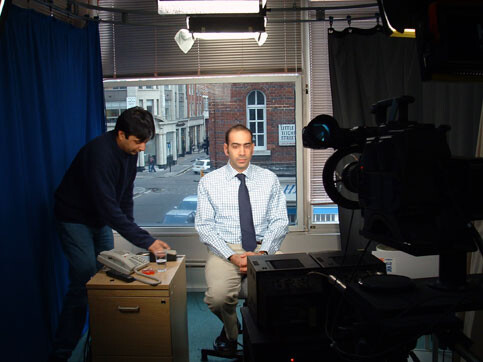The Electronic Intifada 4 July 2005

EI co-founder Ali Abunimah prepares to give an interview at the London bureau of the Canadian Broadcasting Corporation, March 2004. (Benjamin Doherty)
The Palestinian-Israeli conflict gets a disproportionate share of mainstream western media attention, as compared, say, with conflicts in Africa. Yet the public, particularly in the United States, remains grossly misinformed.
Jeffrey Dvorkin, ombudsman for US National Public Radio (NPR), recently claimed that his network’s coverage in 2000-2001 had “a tendency to overreport the impact of the intifada on the Palestinians and underreport the effect on Israelis”. In fact, the opposite was true. During a six-month period near the beginning of the intifada, NPR reported on 84 percent of Israeli civilian deaths, a study by the well-respected Fairness and Accuracy in Reporting organization found, while reporting on only 26 percent of Palestinian civilian deaths. This has been a consistent pattern across the media.
At the time, NPR’s correspondent in Jerusalem, Linda Gradstein, was accepting unethical cash payments worth thousands of dollars annually from pro-Israeli organizations, a practice that was stopped only after it was revealed by an investigation colleagues and I conducted for The Electronic Intifada website. While NPR allowed Gradstein to keep reporting, it had earlier dismissed another correspondent, claiming that she did not disclose to managers that her husband had been an advisor to the Palestinian Authority (PA).
Dvorkin’s revisionism comes as NPR and other media and academic organizations in the United States face intense attack from pro-Israel groups and allies in Congress who view any reporting that does not slavishly toe the Israeli line as being implacably hostile or even anti-Semitic. NPR and its affiliate stations face huge cuts in their government funding, instigated by officials with close ties to the pro-Israel lobby.
Those relying on the mainstream media could be forgiven for believing that Israelis are overwhelmingly the victims of violence, and Palestinians the main perpetrators. News organizations have to be constantly reminded that from the start of the first Palestinian uprising in December 1987, until May 15, 2005, Israelis killed a total of 4,857 Palestinians, the vast majority unarmed civilians, of whom 949 were under the age of 18, according to Israel’s B’Tselem human rights group. In the same period, Palestinians killed 1,382 Israelis, of whom 928 were civilians and 131 children. Few recall that the first ever Palestinian suicide bombing targeting civilians in Israel occurred 40 days after settler Baruch Goldstein’s 1994 massacre of dozens of Palestinians in Hebron.
In general, the media have responded to Zionist pressure groups by resorting to a fake balance in which the reporter simply recites the claims of “both sides” and makes no attempt to assess independently the evidence supporting one and contradicting the other. So, territories that are occupied under international law become “disputed” and settlements built on expropriated, occupied land become “neighborhoods”. The cruel reality of occupation becomes something merely “perceived” by Palestinians.
In terms of political analysis, mainstream media commentary takes its cue from the US government agenda, almost never challenging America’s unconditional support for Israel. Following the death of Yasser Arafat, there was much cliched editorializing about a “window of opportunity” for peace. Almost always ignored are any facts that do not fit in with the rosy scenario. PA Labor Minister Ghassan Khatib recently wrote that “while talking about vacating settlements with less than 2,000 housing units in Gaza, Israel has been busy constructing, this year alone, something like 6,400 housing units in illegal settlements in the West Bank.” Few people are aware of this because the media follow official spin that Sharon’s Gaza plan is significant while his actions in the West Bank are not.
On the Palestinian scene, the questionable election of Mahmoud Abbas—America’s favored candidate—by a fraction of the Palestinian people was hailed as a great victory for democracy, while his blatantly undemocratic decision to cancel scheduled legislative elections his Fatah faction might lose to Hamas has been downplayed. And while there is much talk of Palestinian “reform”, the media rarely focus on the long-standing and credible allegations of major corruption by key PA figures close to Abbas, some of whom are even hailed as “reformers”.
While the media have major shortcomings, there are of course some dedicated and fair journalists whose vital contribution should be recognized. And paradoxically, the PA, which seems to believe international opinion will come to its rescue, has failed to counter Israeli propaganda with a credible communications strategy, largely abandoning the task to ad hoc efforts by Palestinian individuals and private groups. All this points to the vital importance of developing strong, independent Palestinian media tied neither to the PA nor to international donors. The donors’ agenda, after all, is to focus on internal Palestinian “reform” and endless, sterile diplomacy in order to avoid the necessary confrontation with Israel without which there can be no progress toward peace.
Ali Abunimah is co-founder of The Electronic Intifada website. This commentary is one of four published on the topic of the international media and the Palestinian-Israeli conflict in the 30 June 2005 edition of Bitterlemons, a website that presents Israeli and Palestinian viewpoints on prominent issues of concern.



